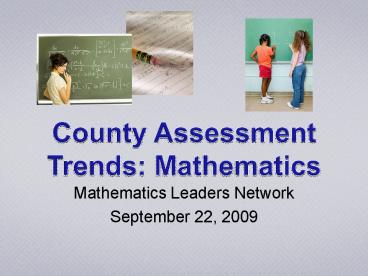County Assessment Trends: Mathematics PowerPoint PPT Presentation
1 / 17
Title: County Assessment Trends: Mathematics
1
County Assessment Trends Mathematics
- Mathematics Leaders Network
- September 22, 2009
2
California Standards Tests in MathematicsGrades
2-11 Combined from 2005 to 2007
3
California Standards Tests in MathematicsGrades
2-11 in 2009
Grade-level Specific Tests
Course Specific Tests
4
California Standards Tests in MathematicsGrade 8
Algebra (or higher)
5
California Standards Tests in MathematicsGrades
8-11 Taking EOC Math Tests
56.8
58.8
22.2
19.1
6
California Standards Test (CST)San Diego County
Trends
- County Summary
- The percent of students scoring proficient or
advanced increased 9 from 2005 to 2009. - Strongest results in 2009 at grades 2-5 where
more than 60 scored proficient or advanced. - Weakest results are end-of-course math,
especially Geometry and Algebra II, where fewer
than 30 scored proficient.
- Celebration
- More county students take higher-level math
courses than students statewide. - Algebra proficiency continues to improve
especially at grade 8 - Challenge
- What support can districts provide to increase
the number of students across all groups taking
and succeeding in higher-level mathematics
coursework?
7
California High School Exit Exam - MathGrade 10
First-time Test Takers
8
CAHSEE Mathematics TestFirst-time Test Takers
- County Summary
- 84 of Grade 10 students passed the CAHSEE math
exam, up 3 from 2005-06. - The achievement gap is closing between Hispanic
and African American students and their White and
Asian counterparts (from 22 in 05-06 to 17 in
08-09), but still remains substantial.
- Celebration
- County first-time test takers passed at a higher
rate (84) than their counterparts statewide
(80). - Challenge
- What proactive support strategies are available
to struggling students, even before they take the
CAHSEE in tenth grade?
9
CST and CAHSEE Math TestsCluster Analysis
- Reporting clusters summarize results at the
strand level - CSTs are equated from year-to-year at the overall
test level but not at the cluster level - Cannot compare the actual percent correct from
year-to-year since the items may vary slightly in
difficulty - Can compare local student results to the
performance of students statewide
10
CST and CAHSEE Math TestsCluster Analysis
- Best Comparison is to the Percent Correct for
Minimally Proficient/Minimally Passing Students
Statewide - The average percentage of items answered
correctly by students statewide that scored at
the lowest scale score to be proficient on the
CST or to pass the CAHSEE (350)
11
CST Mathematics TestGrade 5 Cluster Analysis
2007
2008
2009
12
CST Mathematics TestAlgebra I Cluster Analysis
2007
2008
2009
13
CAHSEE Mathematics TestCluster Analysis
2007
2008
2009
14
CST and CAHSEE Math TestsCluster Analysis Trends
- County Summary
- In 2009, county students in grades 2-5 did better
than minimally proficient students statewide. - The gap between county students and minimally
proficient students widens as grade level
increases. - The greatest gaps are in General Math, Geometry
and Algebra II
- Celebration
- County students in grades 2-6 and Algebra I have
improved over the past three years in relation to
minimally proficient students. - Challenge
- How can we use content cluster results to have
productive instructional conversations with
teachers?
15
CST Released Items
- Released items can help teachers see how
standards are assessed and at what level of rigor - New website provides interactive access to a
substantial bank of CST released items - Items linked to performance levels
- Performance level indicates which students were
most likely to answer the question correctly - An Advanced item was answered correctly by a
majority of students scoring advanced on the
overall grade level/EOC Mathematics test, and by
fewer students at lower levels - A Below Basic item was answered correctly by a
majority of students scoring at below basic
overall
16
CST Exemplars Website
- www.starsamplequestions.org
17
SDCOE Assessment Unit
- Sally Bennett-Schmidt
- sbennettschmidt_at_sdcoe.net
- (858) 292-3688
- Keith Nuthall
- knuthall_at_sdcoe.net
- (858) 292-3593

